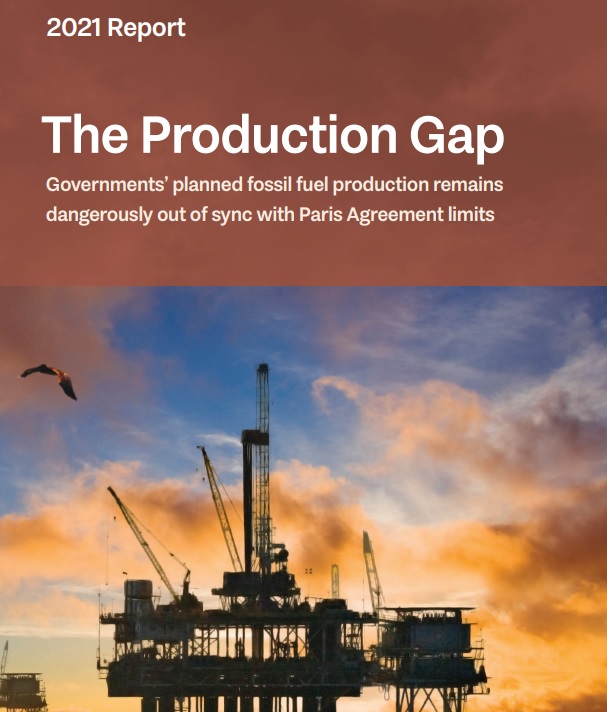 Sean Thompson writes:
Sean Thompson writes:
At the beginning of January, Red Green Labour republished the executive summary of the 2021 edition of The Production Gap, a report produced jointly by the United Nations Environmental Program, the Stockholm Institute and several major environmental research institutions.
The report tracks the discrepancy between governments’ planned fossil fuel production and global production levels consistent with limiting warming to 1.5°C or 2°C and finds that despite the commitments made at COP26, the fifteen major fossil fuel producing states, that between them account for 77% of oil, gas and coal extraction, are planning on increasing production up to 2030 or beyond. In 2030, governments plan to produce 240% more coal, roughly 60% more oil and around 70 % more gas than ithe levels of production that would limit global heating to 1.5°C. Overall, 110% more fossil fuels will be produced in 2030 than the 1.5°C target allows and will lead to warming of 2.4°C.
The UK is, of course, one of those fifteen major producers.
The Westminster Government has repeatedly claimed to be leading the world in reducing CO2 emissions in line with its commitment to the Paris Agreement, and it certainly talks a good fight. Under the terms of the Paris Agreement, by the end of 2020 each signatory had to submit a statement on what contribution it intended to make to meeting that goal in the period up to 2030, its Nationally Determined Contribution (NDC). In 2019, the British Government loudly announced that it was setting a target of net-zero greenhouse gas emissions by 2050. In 2020 its NDC included a pledge to reduce emissions by 68% compared to 1990 by 2030 and last year, on the eve of COP 26, it went further in announcing that it would reduce emissions by 78% by 2035.
However, while the Climate Change Act, which imposed on the government the legally binding obligation to tackle climate change, was passed in 2008, in 2015 the UK Infrastructure Act made it a legal obligation to “maximise economic recovery of UK petroleum” – committing future governments to maximise the production of UK fossil fuels. And in 2017 UK government promised to “extract every drop of oil and gas that it is economic to extract”.
From around 2000, UK oil and gas production dropped steeply until 2014, when the government introduced tax cuts and a series of regulatory changes in order to encourage production. As a result, production of oil and gas grew steadily to 2019. According to the UK’s Oil and Gas Authority (OGA), these changes are expected to lead to 30% more oil and gas production from 2016 to 2050 than would have otherwise occurred. And although in 2021 the OGA projected that by 2040 production would decline by 58% for oil and by 70% for gas, its 2035 Vision (as described in its most recent Corporate Plan) is for production to be well above its previous projections, resulting in an extra 3.5bn barrels being produced by 2050. Clearly, the two projections are incompatible and the Westminster government is going to have to decide which of its two statutory duties – to “maximise economic recovery of UK petroleum” or to meet its target of net zero greenhouse gas emissions by 2050.
Given the levels of continuing government support for production by the big oil companies, the signs don’t look too good. In 2019, the UK government gave a total of £3.7bn in tax allowances and relief for oil and gas production. But that’s not the end of the government’s largesse: the OGA estimates that between 2020 and 2065, the UK will provide £18.3 billion in tax relief for the costs of decommissioning offshore infrastructure. And according to the Treasury, as of December 2020, the UK government had signed 98 Decommissioning Relief Deeds with oil companies, which gave them long term guarantees on the level of tax relief they will receive on future decommissioning.
The government’s support for the fossil fuel industry isn’t (or at least, until very recently hasn’t been) limited to the North Sea either. While, at COP 26, the government announced that it was to be the first G20 government ending all new bilateral public finance for fossil fuel production overseas, only 5 months earlier UK Export Finance approved £300 million in loans and £850 million in guarantees to a major liquid natural gas project in Mozambique, a decision that is, thanks to Friends of the Earth, currently under judicial review.
The attitude of the Tories seems to be based on the prayer of St Augustine, “Please God, make me good, but not just yet.” There are two main reasons for this – the first is that under Johnson’s leadership, the Tories have received a series of huge donations from the energy sector. In 2020 £419,000 was given to the Conservatives by the fossil fuel industry and its allies; oil companies, petrostates, airports and businesses linked with Russian energy tycoons; all of them have either made money from fossil fuels or stand to lose economically or politically from cutting emissions. In all, the Tory party and its MPs have registered £1.3m in gifts and donations from climate sceptics and fossil fuel interests since the 2019 general election.
The second reason is that Tory politicians are not only opportunist and hypocritical but irredeemably short-termist. Its easy for Johnson et al to make grand statements about the UK being “a nation of clean energy” and making “zero carbon by 2050” pledges while enacting policies that are incompatible with them; 2050 is several general elections away and then it will be SEP – Someone Else’s Problem.
An example of this ability to face in (at least) two different directions at once that enabled the UK government to announce in March last year that it will allow oil drillers to keep exploring the North Sea for new reserves, despite its pledge to tackle carbon emissions, as long as they pass a “climate compatibility” test. The government has offered to help the North Sea oil and gas industry cut its carbon emissions through a
joint investment of up to £16bn. In return, the industry has ‘promised’ to cut its carbon emissions by 50% by the end of the decade. Don’t hold your breath.
But the UK government is facing some problems in maintaining its Janus like pose. In December last year Shell announced that it had scrapped plans to invest in Cambo, one of the UK’s largest undeveloped offshore oilfields.
This was partly because growing public concern about the climate crisis and widespread popular opposition to the exploitation of the Cambo field, allied to the SNP’s reliance on its coalition partner the Scottish Greens, made the project increasingly risky and unattractive to Shell, But it was also part of a growing trend. The big established publicly listed firms like Shell, concerned about the reputational costs of pursuing new oil projects in the UK, are moving away from producing oil from the UK offshore, either divesting from the UK entirely or gradually shifting their UK portfolios towards gas and renewables. In turn, a diverse group of new firms are moving in, backed by private equity and overseas state investment funds. The UK government’s fanciful push me pull you goal of maintaining investment in oil while reducing emissions is beginning to increasingly rely on firms whose connections to the UK are limited, and whose willingness to respond to net zero obligations remains to be seen.


